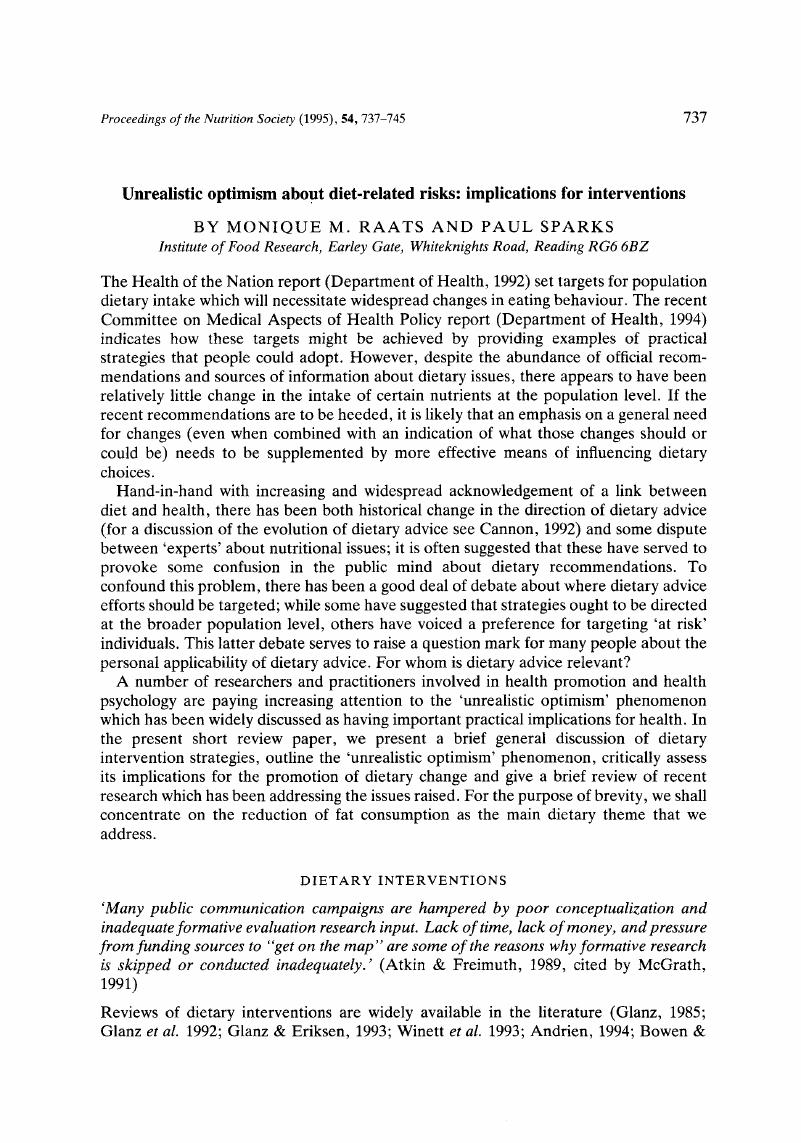Crossref Citations
This article has been cited by the following publications. This list is generated based on data provided by Crossref.
Sparks, Paul
Raats, Monique M.
Geekie, Moira A.
Shepherd, Richard
and
Dale, Claire
1996.
Communication strategies for the effective promotion of dietary change.
Nutrition & Food Science,
Vol. 96,
Issue. 5,
p.
52.
MELA, DAVID J.
1997.
Impact of Macronutrient‐substituted Foods on Food Choice and Dietary Intakea.
Annals of the New York Academy of Sciences,
Vol. 819,
Issue. 1,
p.
96.
Armor, David A.
and
Taylor, Shelley E.
1998.
Advances in Experimental Social Psychology Volume 30.
Vol. 30,
Issue. ,
p.
309.
Lappalainen, Raimo
Kearney, John
and
Gibney, Michael
1998.
A pan EU survey of consumer attitudes to food, nutrition and health: an overview.
Food Quality and Preference,
Vol. 9,
Issue. 6,
p.
467.
Kearney, J. M.
and
McElhone, S.
1999.
Perceived barriers in trying to eat healthier – results of a pan-EU consumer attitudinal survey.
British Journal of Nutrition,
Vol. 81,
Issue. S1,
p.
S133.
Wilcox, Sara
and
King, Abby C.
2000.
Self‐Favoring Bias for Physical Activity in Middle‐Aged and Older Adults1.
Journal of Applied Social Psychology,
Vol. 30,
Issue. 9,
p.
1773.
Miles, Susan
and
Scaife, Victoria
2003.
Optimistic bias and food.
Nutrition Research Reviews,
Vol. 16,
Issue. 1,
p.
3.
Miles, Susan
and
Frewer, Lynn J.
2003.
Public perception of scientific uncertainty in relation to food hazards.
Journal of Risk Research,
Vol. 6,
Issue. 3,
p.
267.
McConnon, A.
Fletcher, P. L.
Cade, J. E.
Greenwood, D. C.
and
Pearman, A. D.
2004.
Differences in perceptions of functional foods: UK public vs. nutritionists.
Nutrition Bulletin,
Vol. 29,
Issue. 1,
p.
11.
Redmond, Elizabeth C.
and
Griffith, Christopher J.
2004.
Consumer perceptions of food safety risk, control and responsibility.
Appetite,
Vol. 43,
Issue. 3,
p.
309.
Stanton, Michael V.
Jonassaint, Charles R.
Bartholomew, Frederick B.
Edwards, Christopher
Richman, Laura
DeCastro, Laura
and
Williams, Redford
2010.
The Association of Optimism and Perceived Discrimination With Health Care Utilization in Adults With Sickle Cell Disease.
Journal of the National Medical Association,
Vol. 102,
Issue. 11,
p.
1056.
Reimer, Holly
Keller, Heather
and
Tindale, Joseph
2012.
Learning you are “at risk”: seniors’ experiences of nutrition risk screening.
European Journal of Ageing,
Vol. 9,
Issue. 1,
p.
81.
Juszczyk, D.
Gillison, F. B.
and
Dean, S.
2014.
Can media images of obese people undermine health messages? An experimental study of visual representation and risk perception.
The European Journal of Public Health,
Vol. 24,
Issue. 6,
p.
930.
Lu, Hang
2015.
Burgers or Tofu? Eating Between Two Worlds: Risk Information Seeking and Processing During Dietary Acculturation.
Health Communication,
Vol. 30,
Issue. 8,
p.
758.
Reyes-Velázquez, Wanda
and
Sealey-Potts, Claudia
2015.
Unrealistic Optimism, Sex, and Risk Perception of Type 2 Diabetes Onset: Implications for Education Programs.
Diabetes Spectrum,
Vol. 28,
Issue. 1,
p.
5.
Pem, Dhandevi
Bhagwant, Suress
and
Jeewon, Rajesh
2016.
A Pre and Post Survey to Determine Effectiveness of a Dietitian-Based Nutrition Education Strategy on Fruit and Vegetable Intake and Energy Intake among Adults.
Nutrients,
Vol. 8,
Issue. 3,
p.
127.
Amuta, Ann O.
Jacobs, Wura
Barry, Adam E.
Popoola, Olufemi A.
and
Crosslin, Katie
2016.
Gender Differences in Type 2 Diabetes Risk Perception, Attitude, and Protective Health Behaviors: A Study of Overweight and Obese College Students.
American Journal of Health Education,
Vol. 47,
Issue. 5,
p.
315.
Pinto, Anna
Mascarello, Giulia
Parise, Nicoletta
Bonaldo, Silvia
Crovato, Stefania
and
Ravarotto, Licia
2017.
Italian consumers’ attitudes towards food risks:self-protectiveandnon-self-protectiveprofiles for effective risk communication.
Journal of Risk Research,
Vol. 20,
Issue. 3,
p.
366.


